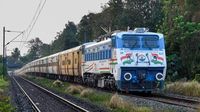New Delhi: As of May 1, 2025, Indian Railways has implemented significant changes to its ticketing policies that will directly affect train passengers across the country. These new rules aim to streamline travel and enhance security, but they also pose challenges for passengers, particularly those with waiting list tickets.
One of the most notable changes is the restriction placed on passengers holding waiting list tickets. Starting today, these travelers are no longer permitted to board sleeper or AC coaches. Instead, they can only travel in general (unreserved) compartments. This shift is designed to prioritize seating for confirmed ticket holders in reserved classes, ensuring a more organized travel experience.
Passengers who attempt to board reserved sleeper or AC coaches with waiting tickets will face penalties. Specifically, violators will incur fines of Rs 250 for sleeper class and Rs 440 for AC coaches. This strict enforcement underscores the Indian Railways' commitment to maintaining order and efficiency within its services.
In addition to the restrictions on waiting list passengers, the advance reservation period (ARP) for booking tickets has also been reduced. Previously set at 120 days, the new ARP allows travelers to book tickets only up to 60 days in advance. This change could impact those who prefer to plan their journeys well ahead of time, as it limits their ability to secure reservations.
Another significant update is the introduction of OTP-based mobile verification for all tickets booked online through the IRCTC website or mobile app. This measure aims to combat fraudulent bookings and ensure the authenticity of users' identities. From now on, every time a ticket is booked online, users will need to verify their mobile number via a one-time password (OTP). This security enhancement is expected to bring greater order and security to train travel, although it may pose challenges for last-minute travelers and those unfamiliar with digital booking processes.
While the focus has been on railway reforms, May 1 also marks the implementation of several other changes across various sectors. For instance, milk prices have risen, with Amul increasing rates by ₹2 per litre. This price hike follows a similar increase by Mother Dairy, indicating a trend in dairy pricing that consumers will need to adapt to.
Furthermore, the Reserve Bank of India (RBI) has also revised ATM transaction charges, which will take effect on May 1, 2025. Frequent ATM users can expect higher charges under the new framework, which alters free transaction limits and fee structures. Consumers are now eligible for three free transactions per month in metropolitan areas and five in non-metropolitan areas. However, any transactions exceeding these limits will incur a charge of Rs 23 per transaction, an increase from the previous Rs 21.
HDFC Bank has provided clarity on the changes, stating, "With effect from 1st May 2025, the ATM transaction charge rate beyond free limits will be revised from Rs 21 + taxes to Rs 23 + taxes, wherever applicable." This adjustment is part of a broader effort to manage the costs associated with ATM services.
Punjab National Bank (PNB) has also communicated changes to its customers. As of May 9, 2025, charges for transactions over and above free limits at other banks' ATMs will be revised to Rs 23 per financial transaction and Rs 11 per non-financial transaction, excluding GST. IndusInd Bank has similarly updated its policies, noting that all customers will incur a charge of Rs 23 per transaction for ATM cash withdrawals at non-IndusInd Bank ATMs beyond free limits, effective May 1, 2025.
As these new policies take effect, consumers and commuters across India will need to stay informed to avoid penalties and inconvenience. The changes reflect a broader push toward reform and regulation, aiming to enhance the overall efficiency of services while addressing potential issues related to fraud and misuse.
In summary, the Indian Railways' new ticketing rules, alongside the revised ATM transaction charges, signify a pivotal shift in how services are managed in India. Passengers and consumers alike will have to navigate these changes carefully, adapting to a new landscape of travel and banking that emphasizes security and order.




